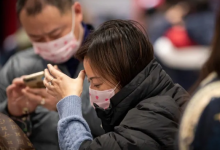19 in Ontario being investigated for coronavirus
Canada’s first case of a new strain of coronavirus has been officially confirmed, Ontario health officials said Monday, as they announced the patient’s wife has also contracted the illness.
Another 19 people in the province are also under investigation for possible infection, said Dr. David Williams, Ontario’s chief medical officer.
The couple had travelled to Wuhan, China, and recently returned to Toronto. The woman has been in self-isolation at home since they arrived, Williams said.
“We are working alongside Toronto Public Health, who has been in regular contact with the individual during their self-isolation period,” he added.
“Given the fact that she has been in self-isolation, the risk to Ontarians remains low.”
Williams updated reporters on the emerging situation at a news conference at Queen’s Park shortly before noon.
The woman’s case is considered “presumptive” until Winnipeg’s National Microbiology Lab confirms the results from Public Health Ontario. That process can take up to 48 hours, he said.
The agency is also awaiting test results for the 19 people under investigation, while the illness was ruled out in the cases of 15 others, said Dr. Barbara Yaffe, associate chief medical officer of health in Ontario. The “vast majority” of the 19 people under investigation are currently in hospital and in isolation, she continued.
“We’re being extra, extra cautious about this,” Yaffe said.
She joined Williams at the news conference, as did Dr. Eileen de Villa, their Toronto counterpart.
The trio couldn’t say whether any of the 19 people who might have the virus were on the same flight back to Toronto as the husband and wife. Williams said the patients currently being tested reside throughout the province, though many are concentrated in Toronto.
Officials previously said the woman’s husband, a man in his 50s, had been showing mild symptoms on the Jan. 22 flight from Guangzhou, China, to Toronto.
“He became more symptomatic in the next 24 hours, and then had a family member not come to the house, [but] call 911, and that person gave clear advice and direction to 911 and paramedics responded appropriately,” Williams said.
Officials have since been reaching out to those aboard the China Southern Airlines flight who sat within two metres of the man.
De Villa said Toronto Public Health has been “working flat out” to identify any potential contacts the two people might have had in the city.
The man is now at the city’s Sunnybrook Hospital, where he remains in stable condition. The woman is at home and is currently “asymptomatic,” de Villa said. No one else lives in the residence, she added.
Public health workers have been in regular contact with the woman to check on her condition, de Villa told reporters.
Concerns at airports
Yaffe said that screening for infection at airports can be difficult.
“There’s no perfect screening in an airport. In fact, [for] SARS, we were doing thermal screening in the airport, and it was found to be totally ineffective,” she said.
Williams said that those who are not currently exhibiting the flu-like symptoms consistent with the coronavirus are likely not contagious.
“If somebody does not have symptoms, they usually are not shedding,” he said, adding researchers are continually studying the virus and becoming more familiar with its characteristics.
Dr. Michael Gardam, an infectious disease specialist and chief of staff at Humber River Hospital in Toronto, said the second case doesn’t make him worry, because the disease was spread between two people who had close contact, and there remains no evidence that the disease is spreading beyond Ontario.
“This is, unfortunately, something we were prepared for,” he said on CBC Radio’s Metro Morning, where he fielded calls from concerned residents in the Greater Toronto Area.
For those who are worried about travelling or being out in public, Gardam said there remains no perfect answer to avoiding illness, but suggested people should avoid anyone who appears sick and always take care to wash their hands.
“Handwashing is something that never goes out of style,” he said.
As for face masks, Gardam said the jury is still out on how effective they are when it comes to preventing the spread of disease. Early data on the new form of the virus suggests masks won’t be especially effective, and some say repeatedly touching and adjusting the masks with unwashed hands could do more harm than good.

Masks may not be effective
Chinese officials said Tuesday the number of deaths from the flu-like virus in Hubei province — where the disease is believed to have originated — has risen by 24, bringing the total now to 106. Authorities reported one in the capital, Beijing.
Meanwhile, the total number of confirmed cases across China has risen to 2,744. All of the cases outside of China, in countries such as the U.S., have been travel-related, Yaffe said.
Global Affairs Canada is now urging Canadians to avoid all travel to the part of China where the new strain of coronavirus originated.
The restriction includes the cities of Wuhan, Huanggang and Ezhoum, where Chinese authorities are clamping down on travel to limit the spread of the virus.
Dr. Theresa Tam, Canada’s chief public health officer, has said she believes there will be more cases “imported into Canada” because of global flight patterns, but she notes there’s little risk of becoming infected here.
Toronto Mayor John Tory said he’s requested that all public health information related to the coronavirus be translated into “languages other than English or French” to ensure the city’s diverse population can stay informed.
Echoing public health officials who stress the risk of contracting the virus remains low, Tory urged residents to maintain business as usual.
“Be careful, be vigilant, but you don’t have to change your life at the moment,” he said.
The news of Canada’s first presumptive coronavirus patient came Saturday as authorities around the world grappled with the new type of virus.
Coronaviruses are a large family of viruses that most often cause mild-to-moderate upper respiratory tract illnesses including the common cold, but they can also lead to severe diseases. Some coronaviruses spread between animals, some pass between animals and people, and others go from people to people.
This new virus is different from the coronaviruses that cause Severe Acute Respiratory Syndrome (SARS) and Middle East Respiratory Syndrome (MERS).
Its symptoms include fever, cough and difficulty breathing. Those with weakened immune systems are most vulnerable to severe disease. That includes the elderly and people with chronic illness, such as diabetes, cancer, heart or lung disease.
Health officials have stressed that while human-to-human transmission of the virus does take place, it’s most likely in cases involving close, prolonged contact with someone who is already infected.
As of last week, the World Health Organization has not designated the outbreak as an international public health emergency.
CBC








Redes Sociais - Comentários